新概念英语第2册第15课重点语法句型
新概念英语第二册 Lesson 15 Good news 佳音

新概念英语第二册Lesson 15 Good news 佳音重点句型补充例句1. When I was first learning to dance, I felt very nervous when taking group classes, mainly becauseI didn't want to look stupid or clumsy in front of others.2. I felt very nervous when I got up after my name was called. I heard my name called out. I got up, my legs unsteady and my whole body trembling like a leaf.3. Moreover, he did not look up from his desk the entire hour and a half that he wrote, stopping only when asked to go to lunch by the teacher.4. He told Susan that business was very bad and no new buildings were under contract.5. Since the Jamia could not afford to pay salaries regularly, it was decided that the lowest paid employee get salary on priority.6. People who could not afford to pay into the system would have their contribution paid for them by the state.Notes on the text 课文注释1 look up, 抬头看。
新概念英语第二册第15课

新概念英语第二册第15课第一篇:新概念英语第二册第15课Lesson 15 Good news 佳音The secretary told me that Mr.Harmsworth would see me.I felt very nervous when I went into his office.He did not look up from his desk when I entered.After I had sat down, he said that business was very bad.He told me that the firm could not afford to pay such large salaries.Twenty people had already left.I knew that my turn had come.'Mr.Harmsworth,' I said in a weak voice.'Don't interrupt,' he said.Then he smiled and told me I would receive an extra thousand pounds a year!New words and expressions 生词和短语secretary n.秘书nervous adj.精神紧张的afford v.负担得起weak adj.弱的 interrupt v.插话,打断参考译文秘书告诉我说哈姆斯沃斯先生要见我。
我走进他的办公室,感到非常紧张。
我进去的时候,他连头也没抬。
待我坐下后,他说生意非常不景气。
他还告诉我,公司支付不起这么庞大的工资开支,有20个人已经离去。
我知道这次该轮到我了。
“哈姆斯沃斯先生,”我无力地说。
“不要打断我的话,”他说。
然后他微笑了一下告诉我说,我每年将得到1,000 英镑的额外收入。
新概念第二册第15课课件

新概念第二册第15课课件新概念第二册第15课是一堂语法课,主要讲述了“there be”句型的用法和注意事项。
这个句型在英语中是非常常见的,也是我们学习英语时需要掌握的一个基础知识点。
下面我会结合课件和自己的一些理解,对这个句型做一些简单的介绍和分析。
首先,让我们来看看这个句型的基本结构。
在英语中,使用“There be”句型时,需要将be动词与名词或代词连用,以表示某个地方存在某些事物。
例如,课件中给出的例句:“There is a book on the desk.”,就是一个典型的“There be”句型。
在使用这个句型时,我们需要注意几个问题。
首先是名词的单复数问题。
这个句型中的名词需要与be动词一致,因此需要遵循名词单复数的规则。
例如,“There are three books on the desk.”中的books就是复数形式。
除了名词单复数问题外,我们还需要注意有无冠词的区别。
有些情况下,“There be”句型中的名词前会带有不定冠词a/an,有些情况下则不带冠词。
通常情况下,出现具体的物品时需要使用冠词,而出现抽象的概念时则不需要。
例如,“There is a pen o n the desk.”中的pen是具体的物品,因此前面需要使用冠词a。
此外,我们还需要注意这个句型的否定和疑问形式。
在否定形式中,需要在be动词之后加上not,例如“There is not a book onthe desk.”;而在疑问形式中,则需要将be动词和主语颠倒,例如“Is there a book on the desk?”。
除了这些注意事项之外,我们还可以在实际运用中提高这个句型的使用效果。
例如,在描述某一个地点时,可以使用“There be”句型来介绍这个地方所包含的事物或设施。
在写作或演讲中,也可以利用这个句型来引入主题或话题,让听众更好地理解和关注。
综上所述,新概念第二册第15课所介绍的“There be”句型是英语中非常重要的基础语法之一。
新概念第二册Lesson 15知识要点总结

新概念第二册Lesson 15复习要点一.词汇讲解:1.secretary秘书secret秘密tell a secret说出一个秘密/keep a secret保守一个秘密2.nervous紧张的be nervous about....I am nervous about the tests.我对考试感到紧张。
irritable易怒的Sick people are usually irritable.生病的人易怒。
3.afford负担得起I can’t afford this house.I can’t afford to buy this house.4.weak弱的in a weak voice 以一种微弱的声音in a low voice以很低的声音weakness 弱点5.interrupt 打断Don’t interrupt him when he is speaking.他在说话的时候不要打断他。
二.直接引语和间接引语:1.Tony said:“I am doing my homework.”---> Tony said he was doing his homework.2.Tony said:“Tom went to the party ?”--->Tony said Tom had gone to the party.3.Tony said:“The meeting will start soon.”--->Tony said that the meeting would start soon.4.Tony said:“I can take the book to him.”--->Tony said he could take the book to him.注意:1.人称的变化2.时态的变化3.语序的变化三.短语要点:1.look up抬头看look down 向下看look down on...轻视......People look down on us here.这里的人们看不起我们。
新概念第二册第15课
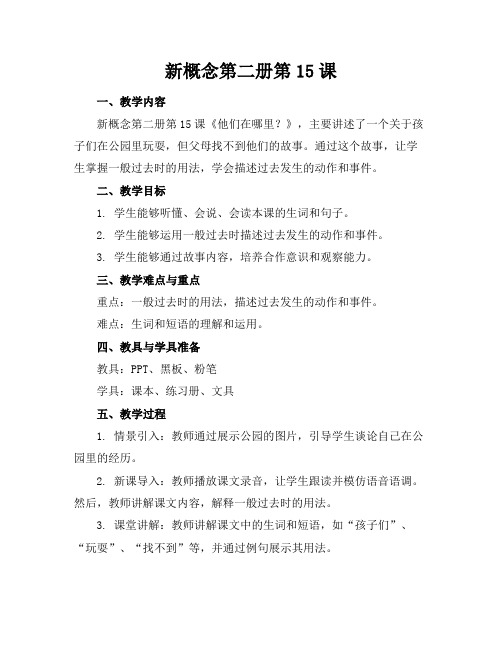
新概念第二册第15课一、教学内容新概念第二册第15课《他们在哪里?》,主要讲述了一个关于孩子们在公园里玩耍,但父母找不到他们的故事。
通过这个故事,让学生掌握一般过去时的用法,学会描述过去发生的动作和事件。
二、教学目标1. 学生能够听懂、会说、会读本课的生词和句子。
2. 学生能够运用一般过去时描述过去发生的动作和事件。
3. 学生能够通过故事内容,培养合作意识和观察能力。
三、教学难点与重点重点:一般过去时的用法,描述过去发生的动作和事件。
难点:生词和短语的理解和运用。
四、教具与学具准备教具:PPT、黑板、粉笔学具:课本、练习册、文具五、教学过程1. 情景引入:教师通过展示公园的图片,引导学生谈论自己在公园里的经历。
2. 新课导入:教师播放课文录音,让学生跟读并模仿语音语调。
然后,教师讲解课文内容,解释一般过去时的用法。
3. 课堂讲解:教师讲解课文中的生词和短语,如“孩子们”、“玩耍”、“找不到”等,并通过例句展示其用法。
4. 实践环节:教师组织学生进行角色扮演,模拟故事中的情景,让学生运用一般过去时描述动作和事件。
5. 随堂练习:教师发放练习册,让学生完成相关的练习题,巩固所学知识。
7. 作业布置:教师布置作业,让学生运用一般过去时写一篇小作文。
六、板书设计黑板上写出一句话:“他们在哪里?”然后,教师通过板书,将句子变成一般过去时的形式:“他们在哪里?”七、作业设计1. 作业题目:请用一般过去时写一篇关于你在公园里玩耍的小作文。
2. 作业答案:(示例)昨天,我和我的朋友们一起去公园玩耍。
我们跑了很长时间,玩得非常开心。
但是,当我们想找我们的父母时,我们发现他们不见了。
我们到处找他们,但找不到。
我们决定去附近的餐馆找他们,因为他们说要给我们买冰淇淋。
当我们到达餐馆时,我们终于找到了他们。
他们都坐在那里等着我们,我们非常高兴。
八、课后反思及拓展延伸本节课通过一个有趣的故事,让学生掌握了一般过去时的用法。
新概念英语第二册第15课

新概念英语第⼆册第15课Lesson 15 Good NewsThe secretaryalready left. I knew that my turn had come.'Mr. Harmsworth,' I said in a weak voice.'Don't interrupt,' he said.New words and expressions ⽣词和短语1.secretary ['sekr?t?ri] n. 秘书(secret['si:krit])私⼈秘书?2.nervous [?n?rv?s] adj. 精神紧张的;3.afford [??f?rd] v. 负担得起;4.weak [wik] adj. 弱的;5.interrupt [??nt??r?pt] v. 插话,打断参考译⽂:秘书告诉我说哈姆斯沃斯先⽣要见我。
我⾛进他的办公室,感到⾮常紧张。
我进去的时候,他连头也没抬。
待我坐下后,他说⽣意⾮常不景⽓。
他还告诉我,公司⽀付不起这么庞⼤的⼯资开⽀,有20个⼈已经离去。
我知道这次该轮到我了。
“哈姆斯沃斯先⽣,”我⽆⼒地说。
“不要打断我的话,”他说。
然后他微笑了⼀下告诉我说,我每年将得到1,000 英镑的额外收⼊。
1.The secretary told me that Mr. Harmsworth would see me.2.I felt very nervous when I went into his office.3.He did not look up from his desk when I entered.4.After I had sat down, he said that business was very bad.5.He told me that the firm could not afford to pay such large salaries.6.Twenty people had already left.7.I knew that my turn had come.8.'Mr. Harmsworth,' I said in a weak voice.9.'Don't interrupt,' he said.10.T hen he smiled and told me I would receive an extra thousand pounds a year!参考译⽂1.秘书告诉我说哈姆斯沃斯先⽣要见我。
新概念英语第二册语法精讲-Lesson15
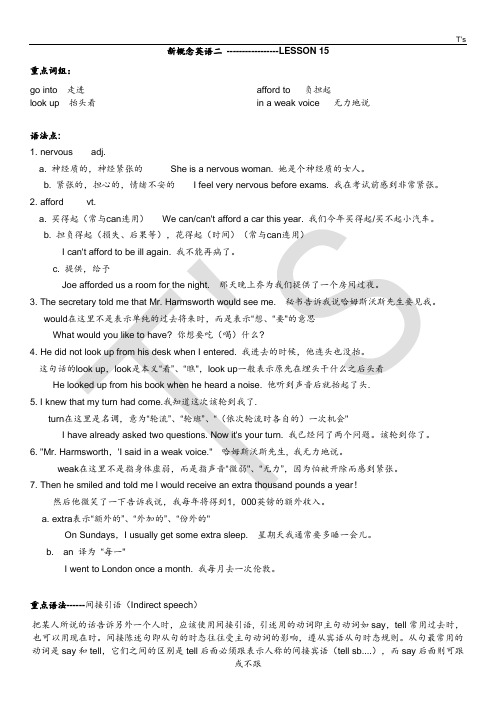
新概念英语二-----------------LESSON 15重点词组:go into 走进look up 抬头看afford to 负担起in a weak voice 无力地说语法点:1. nervous adj.a. 神经质的,神经紧张的 She is a nervous woman. 她是个神经质的女人。
b. 紧张的,担心的,情绪不安的 I feel very nervous before exams. 我在考试前感到非常紧张。
2. afford vt.a. 买得起(常与can连用)We can/can't afford a car this year. 我们今年买得起/买不起小汽车。
b. 担负得起(损失、后果等),花得起(时间)(常与can连用)I can't afford to be ill again. 我不能再病了。
c. 提供,给予Joe afforded us a room for the night. 那天晚上乔为我们提供了一个房间过夜。
3. The secretary told me that Mr. Harmsworth would see me. 秘书告诉我说哈姆斯沃斯先生要见我。
would在这里不是表示单纯的过去将来时,而是表示“想、“要"的意思What would you like to have? 你想要吃(喝)什么?4. He did not look up from his desk when I entered. 我进去的时候,他连头也没抬。
这句话的look up,look是本义“看”、“瞧",look up一般表示原先在埋头干什么之后头看He looked up from his book when he heard a noise. 他听到声音后就抬起了头.5. I knew that my turn had come.我知道这次该轮到我了.turn在这里是名调,意为“轮流”、“轮班”、“(依次轮流时各自的)一次机会"I have already asked two questions. Now it's your turn. 我已经问了两个问题。
新概念第二册第15课课堂笔记
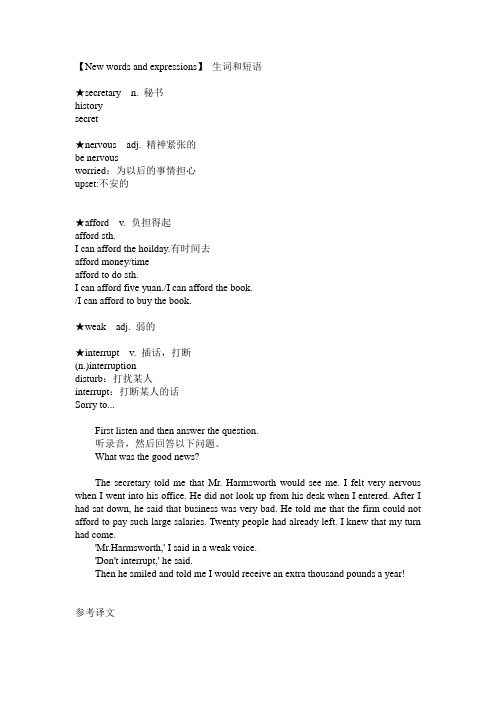
【New words and expressions】生词和短语★secretary n. 秘书historysecret★nervous adj. 精神紧张的be nervousworried:为以后的事情担心upset:不安的★afford v. 负担得起afford sth.I can afford the hoilday.有时间去afford money/timeafford to do sth.I can afford five yuan./I can afford the book./I can afford to buy the book.★weak adj. 弱的★interrupt v. 插话,打断(n.)interruptiondisturb:打扰某人interrupt:打断某人的话Sorry to...First listen and then answer the question.听录音,然后回答以下问题。
What was the good news?The secretary told me that Mr. Harmsworth would see me. I felt very nervous when I went into his office. He did not look up from his desk when I entered. After I had sat down, he said that business was very bad. He told me that the firm could not afford to pay such large salaries. Twenty people had already left. I knew that my turn had come.'Mr.Harmsworth,' I said in a weak voice.'Don't interrupt,' he said.Then he smiled and told me I would receive an extra thousand pounds a year!参考译文秘书告诉我说哈姆斯沃斯先生要见我。
新概念英语第2册课程讲义Lesson15
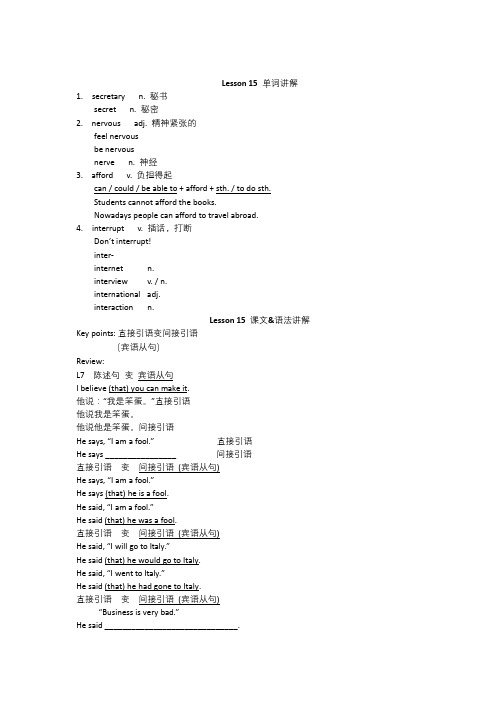
Lesson 15 单词讲解1. secretary n. 秘书secret n. 秘密2. nervous adj. 精神紧张的feel nervousbe nervousnerve n. 神经3. afford v. 负担得起can / could / be able to + afford + sth. / to do sth.Students cannot afford the books.Nowadays people can afford to travel abroad.4. interrupt v. 插话,打断Don’t interrupt!inter-internet n.interview v. / n.international adj.interaction n.Lesson 15 课文&语法讲解Key points: 直接引语变间接引语(宾语从句)Review:L7 陈述句变宾语从句I believe (that) you can make it.他说:“我是笨蛋。
”直接引语他说我是笨蛋。
他说他是笨蛋。
间接引语He says, “I am a fool.”直接引语He says ________________ 间接引语直接引语变间接引语(宾语从句)He says, “I am a fool.”He says (that) he is a fool.He said, “I am a fool.”He said (that) he was a fool.直接引语变间接引语(宾语从句)He said, “I will go to Italy.”He said (that) he would go to Italy.He said, “I went to Italy.”He said (that) he had gone to Italy.直接引语变间接引语(宾语从句)“Business is very bad.”He said ______________________________.直接引语变间接引语(宾语从句)“Mr. H will see you.”The secretary told me ___________________________.直接引语变间接引语(宾语从句)“You will receive a thousand pounds.”He told me _________________________________________.1. The secretary told me that Mr. … would see me.2. After I had sat down, he said that business was … bad.3. He told me that the firm could not afford to pay …4. I knew that my turn had come.5. Then he smiled and (he) told me (that) I would receive …1. The secretary told me that Mr. … would see me.2. After I had sat down, he said that business was … bad.3. He told me that the firm could not afford to pay …4. I knew that my turn had come.5. Then he smiled and told me (that) I would receive …Lesson 15 知识拓展高考新题型单词拼写More and more Chinese people are able to _______ (负得起) to travel abroad. more and more people= an increasing number of people( 陕西)Will you stop ____________ (打断) me when I’m talking?stop doing sth. stop to do sth. ( 全国) 陈述句变宾语从句You are right.I think ____________________.我相信我能飞。
新概念第二册第15课语法
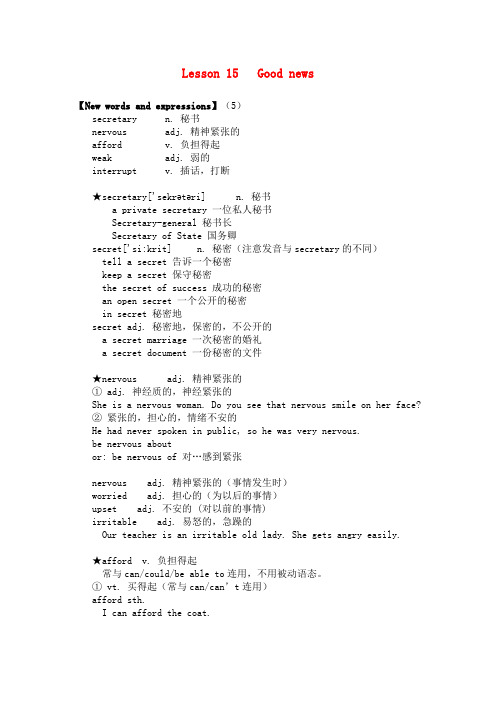
Lesson 15 Good news【New words and expressions】(5)secretary n. 秘书nervous adj. 精神紧张的afford v. 负担得起weak adj. 弱的interrupt v. 插话,打断★secretary['sekrətəri] n. 秘书a private secretary 一位私人秘书Secretary-general 秘书长Secretary of State 国务卿secret['si:krit] n. 秘密(注意发音与secretary的不同)tell a secret 告诉一个秘密keep a secret 保守秘密the secret of success 成功的秘密an open secret 一个公开的秘密in secret 秘密地secret adj. 秘密地,保密的,不公开的a secret marriage 一次秘密的婚礼a secret document 一份秘密的文件★nervous adj. 精神紧张的① adj. 神经质的,神经紧张的She is a nervous woman. Do you see that nervous smile on her face?②紧张的,担心的,情绪不安的He had never spoken in public, so he was very nervous.be nervous aboutor: be nervous of 对…感到紧张nervous adj. 精神紧张的(事情发生时)worried adj. 担心的(为以后的事情)upset adj. 不安的 (对以前的事情)irritable adj. 易怒的,急躁的Our teacher is an irritable old lady. She gets angry easily.★afford v. 负担得起常与can/could/be able to连用,不用被动语态。
新概念英语第二册课堂笔记:第15课

新概念英语第二册课堂笔记:第15课新概念英语第二册课堂笔记:第15课Lesson 15★New words and expressions☆secretary n.秘书secret n.秘密☆nervous adj.精神紧张的nervous:事情正在发生worried:为以后的事情担心upset:不安的,事情发生以后☆afford v.负担得起afford sth:I can afford the book.afford money/time:I can afford five yuan.afford to do sth:I can afford to buy the book.注意:一定要加情态动词can☆interrupt v.插话,打断n.interruptiondisturb sb:打扰某人interrupt sb:打断某人的话★TextGood newsThe secretary told me Mr Harmsworth would see me.I felt very nervous when I went into his office.He did not look up from his desk when I entered.After I had sat down,he said that business was very bad.He told me that the firm could not afford to pay such large salaries.Twenty people had already left.I knew that my turn had come.'Mr Harmsworth.'I said in a weak voice.'Don't interrupt.'he said.Then he smiled and told me I would receive an extrathousand pounds a year!☆look up:朝上看look down:朝下看look down upon/on sb:瞧不起某人(词义太重)☆Th e firm could not afford to pay such large salaries.(重点)pay salaries:支付薪水;collect salary:领薪水如此:so,suchso的后面加形容词或副词such的后面加名词,允许在该名词前加修饰词☆My turn has come.(书面语)It's my turn.(口语)☆in a ... voicein a loud/low/weak/strong voicelow:音量低;weak:心里不塌实☆extra,other,more,another最灵活的是moremore能够放数词和名词之间,甚至能够放在整个名词的后面extra和other一定放在数词和名词之间,another一定放在数词前面记住几个短语:one extra thousand;two others;oncemore;another three days★Key structures陈述句的间接引语(宾语从句)一.主从一致:主句和从句的时态一致主句的动词为一般现在时,从句为任意时态主句的动词为一般过去时,从句为相对应的过去时态一般现在时——一般过去时现在实行时——过去实行时现在完成时——过去完成时将来完成时——过去将来完成时一般过去时——过去完成时二.人称变化主要是第一和第二人称变化,“设身处地”三.只要属于宾语从句,引导词that能够省略。
新概念英语二级第15课笔记

【New words and expressions】★secretary n.?秘书两种发音,同样还有history也是两种发音secret n.?秘密(注意发音与secretary的不同)★nervous adj.?精神紧张的①?adj.?神经质的,神经紧张的She is a nervous woman. Do you see that nervous smile on her face②?紧张的,担心的,情绪不安的He had never spoken in public, so he was very nervous.nervous adj.?精神紧张的(事情发生时)worried adj.?担心的(为以后的事情)upset adj.?不安的?(对以前的事情)irritable adj.?易怒的,急躁的Our teacher is an irritable old lady. She gets angry easily.★afford v.?负担得起①?vt.?买得起(常与can/can’t?连用)afford sth.I can afford the coat.②?vt.?担负得起(损失、后果等),花得起(时间)(常与can/can’t?连用)afford money/timeI can afford the hoilday. (有时间去)I can afford five yuan.I can only afford one week for the trip.afford to do sth.I can’t afford to be ill again.?我不能再病了。
I can afford to buy the book.③?vt.?提供,给予Joe afforded us a room for the night.★interrupt v.?插话,?打断interrupt v.?打断某人的话disturb v.?打扰某人Sorry to disturb you.interruption n.?中断,打断【课文讲解】1、The secretary told me that Mr. Harmsworth would see me.would在这里不是表示单纯的过去将来时,而是表示“想……”、“要……”的意思:What would you like to haveJohn wouldn’t lend me his bicycle.2、He did not look up from his desk when I entered.look up?表示原先在埋头干什么,之后抬头看He looked up (from his book) when he heard a noise.l ook down?往地上看(look up?的反义词)look down upon/on sb.?瞧不起某人I look down upon my sister.3、After I had sat down, he said that business was very bad.Business is very good!?生意好!4、He told me that the firm could not afford to pay such large salaries. collect salary?领薪水pay salary?支付薪水large一般指东西的数量大so的后面加形容词或副词;such的后面加名词,?容许在该名词前面加修饰词5、I knew that my turn had come.turn n.?轮流,轮班,(依次轮流时各自的)一次机会My turn has come.It is my turn.?轮到我了(口语常用形式)When his turn came, he couldn’t speak any word.6、',' I said in a weak voice.in a?…?voice?用……的声音in a loud(大声)/low (低声)/weak(强调心里不踏实)/strong(理直气壮) voice7、Then he smiled and told me I would receive an extra thousand pounds a year!以下几个词都可表示“再,?又”?的意思,?注意用法:①?an extra thousand(作名词看)数量+extra+名词再有多少On Sundays, I usually get some extra sleep.Last month, he was paid an extra hundred pounds.②?two others = two other +名词③?two moreGive me two extra/other/more books.?再给我两本书。
新概念英语第2册语法知识点Lesson13~15
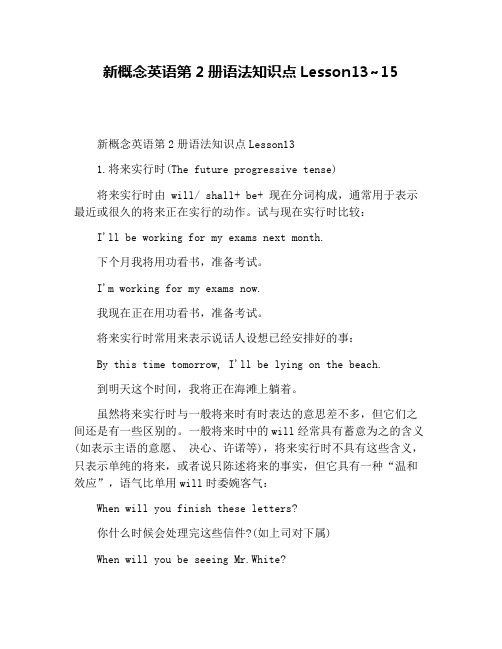
新概念英语第2册语法知识点Lesson13~15新概念英语第2册语法知识点Lesson131.将来实行时(The future progressive tense)将来实行时由 will/ shall+ be+ 现在分词构成,通常用于表示最近或很久的将来正在实行的动作。
试与现在实行时比较:I'll be working for my exams next month.下个月我将用功看书,准备考试。
I'm working for my exams now.我现在正在用功看书,准备考试。
将来实行时常用来表示说话人设想已经安排好的事:By this time tomorrow, I'll be lying on the beach.到明天这个时间,我将正在海滩上躺着。
虽然将来实行时与一般将来时有时表达的意思差不多,但它们之间还是有一些区别的。
一般将来时中的will经常具有蓄意为之的含义(如表示主语的意愿、决心、许诺等),将来实行时不具有这些含义,只表示单纯的将来,或者说只陈述将来的事实,但它具有一种“温和效应”,语气比单用will时委婉客气:When will you finish these letters?你什么时候会处理完这些信件?(如上司对下属)When will you be seeing Mr.White?你什么时候会见到怀特先生?(如下属对上司)What will you be doing this time tomorrow?你明天这时候会在千什么?(不是问意图,只问事实)I'll be playing tennis.我会在打网球。
否定式也有这些区别:Mary won't pay this bill.玛丽不付账。
(她拒绝付账)Mary won't be paying this bill.玛丽不会付账。
(将来的事实)2.名词的所有格我们一般只对人和某些生物用-s。
新概念2 lesson15知识点课件
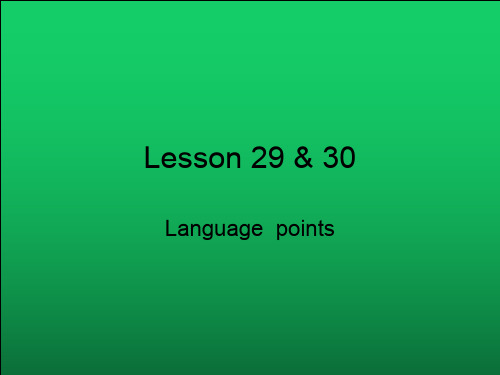
• hate v仇恨,恨;
I hated it if you interrupt me
~sb for sth因某事而恨某人
I hate myself for feeling jealous.
讨厌;憎恶
She hates to be interrupted in class.
不愿;不想
I hate to say it, but I don’t think their marriage will last. n仇恨;仇恨的人(或事物)
year. adv.额外地,另外地;格外,特别
I want to eat extra , because I still feel hungry. It’s extra cold today.
• interrupt v.插嘴,打断
Sorry to interrupt you, but there is someone to see you. 使暂停;使中断
You buy a ticket in turn at the ticket office.
复习
turn on/up/down/off
to/into/over/out (to be)
turn left/right
One good turn deserves another.
• lose v1 vt遗失,丢失; ;失去
note
n 笔记,记录;注释,批注;纸币;音符
see note 3, page 290.见290注释3.// the notes to the text.
a $5 note take notes a musical note
take note of 注意到;将…铭记在心
Lessons15新概念英语第二册课后答案详解

【导语】新概念英语⽂章短⼩精悍,语句幽默诙谐,语法全⾯系统。
适合各个阶层的⼈群学习参考。
相信有了新概念英语,你也可以成为“⼤神”级别的⼈物!还在等什么?快来加⼊学习吧!⼩编与您⼀起学习进步! 新概念英语第⼆册第15课词汇学习 Word study nervous adj. (1)神经质的,神经紧张的: She is a nervous woman. Do you see that nervous smile on her face? 她是个神经质的⼥⼈。
你看见她脸上那种神经质的微笑了吗? (2)紧张的,担⼼的,情绪不安的: I feel very nervous before exams. 我在考试前感到⾮常紧张。
He had never spoken in public, so he was very nervous. 他从未当众讲过话,因此他⾮常紧张。
(3)与nervous容易混淆的另⼀个词是 irritable(易怒的,急躁的): Our teacher is an irritable old lady. She gets angry easily. 我们的⽼师是位脾⽓急躁的⽼太太。
她很容易⽣⽓。
afford vt. (1)买得起(常与can连⽤): We can/can't afford a car this year. 我们今年买得起/买不起⼩汽车。
(2)担负得起(损失、后果等),花得起(时间)(常与can连⽤): I can't afford to be ill again. 我不能再病了。
I can only afford one week for the trip. 我只能为这次旅⾏抽出⼀周的时间。
(3)提供,给予: Joe afforded us a room for the night. 那天晚上乔为我们提供了⼀个房间过夜。
新概念英语第⼆册第15课练习答案 Key to written exercises 1.关键句型练习答案 A 1a The secretary told me that Mr. Harmsworth would see me. b'Mr. Harmsworth will see you. ' 2 a Mr. Harmsworth said that business was very bad. b 'Business is very bad.' 3 a Mr. Harmsworth told me that the firm could not afford to pay such large salaries. b 'The firm cannot afford to pay such large salaries. ' B 1 told… would come/would be coming 2 said…(had) cut 3 told… had never played 4 did he say…had done/would do 5 did he tell…(had) bought/would buy 6 said…could not 7 said…(had) worked 8 told…wrote/writes/had never written 9 did you say…were/had been 10 said…would wait 2.难点练习答案1 study2 office3 nervous4 afford5 irritable 3.多项选择题答案 1d 2b 3c 4b 5c 6d 7a 8d 9c 10c 11c 12b。
新概念英语第二册 第15课课后题知识讲解

难点
1.nervous / irritable 2.office /study /desk 3.afford
练习题:
1.We shall use the spare room in our new house as a study.
2.Smith works in a lawyer’s 办 公室 office .
4.Did he say that business was bad or did he say that it was good?
He said that business was bad
5.Could the firm pay such large salaries or not?
The firm couldn’t pay such large salaries .
关键句型---宾语从句(间接引语)
1.‘I am busy,’ he said. He says that he is busy. He said that he was busy. He told me that he was busy. 2.‘I never work on Sundays,’she She says that she never works-She said that she never worked-
句子结构(同义句) The firm hadn’t the money
to pay such large salaries.
have money to Fra biblioteko sth=can afford to do sth
The firm couldn’t afford to pay such large salaries.
新概念二册15笔记
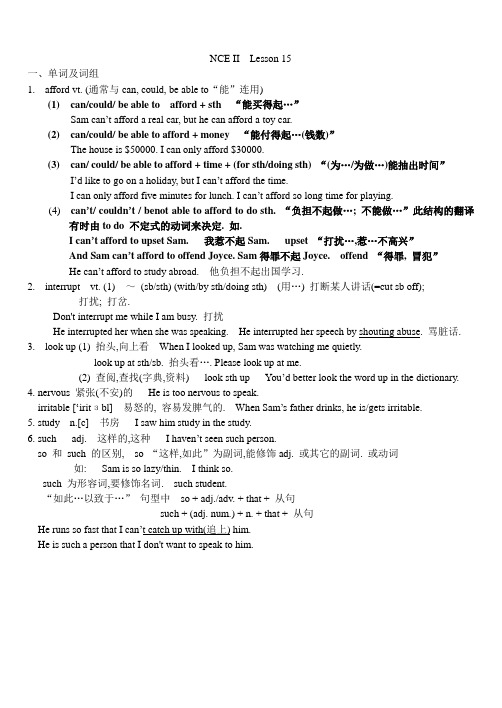
NCE II Lesson 15一、单词及词组1.afford vt. (通常与can, could, be able to“能”连用)(1)can/could/ be able to afford + sth “能买得起…”Sam can’t afford a real car, but he can afford a toy car.(2)can/could/ be able to afford + money “能付得起…(钱数)”The house is $50000. I can only afford $30000.(3)can/ could/ be able to afford + time + (for sth/doing sth) “(为…/为做…)能抽出时间”I’d like to go on a holiday, but I can’t afford the time.I can only afford five minutes for lunch. I can’t afford so long time for playing.(4) can’t/ couldn’t / benot able to afford to do sth. “负担不起做…; 不能做…”此结构的翻译有时由to do 不定式的动词来决定. 如.I can’t afford to upset Sam. 我惹不起Sam. upset “打扰…,惹…不高兴”And Sam can’t afford to offend Joyce. Sam得罪不起Joyce. offend “得罪, 冒犯”He can’t afford to study abroad. 他负担不起出国学习.2.interrupt vt. (1) ~(sb/sth) (with/by sth/doing sth) (用…) 打断某人讲话(=cut sb off);打扰; 打岔.Don't interrupt me while I am busy. 打扰He interrupted her when she was speaking. He interrupted her speech by shouting abuse. 骂脏话.3.look up (1) 抬头,向上看When I looked up, Sam was watching me quietly.look up at sth/sb. 抬头看…. Please look up at me.(2) 查阅,查找(字典,资料) look sth up You’d better look the word up in the dictionary. 4. nervous 紧张(不安)的He is too nervous to speak.irritable [‘iritзbl] 易怒的, 容易发脾气的. When Sam’s father drinks, he is/gets irritable.5. study n.[c] 书房I saw him study in the study.6. such adj. 这样的,这种I haven’t seen such person.so 和such 的区别, so “这样,如此”为副词,能修饰adj. 或其它的副词. 或动词如: Sam is so lazy/thin. I think so.such 为形容词,要修饰名词. such student.“如此…以致于…”句型中so + adj./adv. + that + 从句such + (adj. num.) + n. + that + 从句He runs so fast that I can’t catch up with(追上) him.He is such a person that I don't want to speak to him.。
新概念英语二册Lesson15详细教案笔记

【New words and expressions】(5)●secretary [ˈsekrətri] n. 秘书●secret n. 秘密★ nervous [ˈnɜːvəs] adj. 精神紧张的(事情发生时)●be nervous about sb./sth. 对…紧张eg. He was so nervous about this child that he couldn’t sleep.他很紧张他的孩子,睡不着。
反:calm (adj.) 冷静的eg. Please keep calm. 请保持冷静。
●worried (adj.) 担心(对以后发生的事) be worried about sb./sth. 对…担忧●afford [əˈfɔːd] vt. 负担得起(常与can、can’t连用)(1)afford + sth.eg. I can’t afford the house.我买不起这房子。
I can only afford one week for the trip.我只有一个星期能够旅行。
(2)afford + to do sth.eg. I can’t afford to wait for the bus any longer.我不能再等车了。
(not…any longer 不再…)I can’t afford to be ill again. 我不能再生病了。
(3)v. 提供 = give 给(双宾语)●afford sb. sth. = afford sth. to sb.= give sb. sth. = give sth. to sb.eg. He afforded us a room for the night.晚上,他提供给我们一间房。
= He afforded a room for the night to us.●weak [wiːk] adj. 弱的●同音异义词:week (n.) 星期反义词:strong adj. 强壮的eg. weak tea/coffee 淡茶/淡咖啡strong tea/coffee 浓茶/浓咖啡I felt weak in the legs. 我感到双腿无力。
- 1、下载文档前请自行甄别文档内容的完整性,平台不提供额外的编辑、内容补充、找答案等附加服务。
- 2、"仅部分预览"的文档,不可在线预览部分如存在完整性等问题,可反馈申请退款(可完整预览的文档不适用该条件!)。
- 3、如文档侵犯您的权益,请联系客服反馈,我们会尽快为您处理(人工客服工作时间:9:00-18:30)。
新概念英语第2册第15课重点语法句型
一、重要句型或语法
1、间接引语
可结合第一册第99-102课和第133-136课的内容,对间接引语进行一次总的复习,侧重直接引语转换为间接引语的三大变化原则,即时态变化、人称变化和句型变化原则。
二、课文主要语言点
The secretary told me that Mr. Harmsworth would see me. 1)secretary,秘书。
注意其发音和拼写。
2)可让学生说出其直接引语的内容。
I felt very nervous when I went into his office. 1)由felt一词,可简单复习一下感官系动词的内容。
2)nervous,紧张的。
名词原形为nerve。
He did not look up from his desk when I entered. 1)look up from,从...地方抬头。
2)enter,相当于前一句话中的go into。
注意该词开头的e的发音为/e/,不是/?/。
After I had sat down, he said that business was very bad. 1)可提问学生为什么after引导的从句中的sit要用过去完成时。
2)可让学生说出其直接引语的内容。
3)注意生意好坏的表达,即:Business is good/bad.
He told me that the firm could not afford to pay such large salaries. 1)注意间接引语中tell与say的不同用法:如果后面紧跟sb.,就用tell;如果紧跟that或是to sb.,则用say。
2)firm,公司,泛指所有公司。
3)afford,承担。
一般用作:afford sth.或afford to do sth. 4)salary,月薪或年薪。
注意与wage(周薪和pay(时薪)的区别。
Twenty people had already left. 可提问学生本句动词为什么用过去完成时。
I knew that my turn had come. 1)句中的my turn指的是被公司解雇的事情。
2)注意“One's turn has come”句型的运用,表示“该轮到谁了。
”,也可以表达为:It's one's turn.
Mr. Harmsworth,' I said in a weak voice. in a weak voice,低声(说)。
Don't interrrupt,' he said. 1)interrupt,打断、插话。
2)注意don't和interrupt 的连读。
Then he smiled and told me I would receive an extra thousand pounds a year.
1)extra,额外的。
2)注意thousand在句中表示确定的数字,所以不能用复数。
三、读写重点
可介绍引号的用法,注意区分中英文里引号的区别。
1 2。
